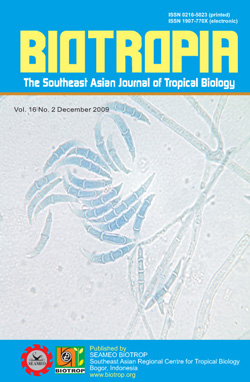
SEAMEO BIOTROP
Southeast Asian Ministers of Education Organization
529
views
Tags
DISTRIBUTION AND DIVERSITY OF FUSARIUM SPECIES ASSOCIATED WITH GRASSES IN TEN STATES THROUGHOUT PENINSULAR MALAYSIA
23 May 2019 - 12:31 pm (6 year ago)
Content Language : English
Content Language : English

Category :
Applied Science
Fusarium is one of the important genera associated with grasses as saprophytes, endophytes
and pathogens. A study was carried out on distribution and diversity of Fusarium species
associated with two groups of grasses in 10 states throughout Peninsular Malaysia i.e.
agricultural grasses (Oryza sativa and Saccharum officinarum) and non-agricultural grasses
(Axonopus compressus, Centhotheca lappacea, Chloris barbata, Crysopogon aciculatus, Cyanadon dactylon,
Dactyloctenium aegyptium, Digitaria ciliaris, Echinochloa colona, Eleusine indica, Eragrostis amabilis,
Eragrostis malayana, Eragrostis uniloides, Ischaemum magnum, Panicum brevifolium, Panicum millaneum,
Panicum repens, Paspalum commersonii, Paspalum conjugatum, Paspalum orbiculare, Pennisetum purpureum,
Sacciolepis indica, Sporobolus diander and Sporobolus indicus). A total of 474 isolates were single-
spored and identified by morphological characteristics. F. semitectum was frequently isolated
(23.6%), followed by F. sacchari and F. fujikuroi with 15.4% and 14.6%, respectively. The other
nine species were F. solani (10.3%), F. proliferatum (8.9%), F. oxysporum (7.4%), F. subglutinans
(6.5%), F. equiseti (5.5%), F. verticillioides (3.4%), F. compactum (2.5%), F. chlamydosporum (1.1%) and
F. longipes (0.8%). Based on the Shannon-Weiner Index, F. solani was the highest (H' = 2.62)
isolated from grasses. Species of Fusarium from O. sativa were widely diverse with 11 species,
followed by non-agricultural grasses with nine species and S. officinarum with only six species.
This is the first report on diversity of Fusarium associated with grasses in Malaysia.
Key words: Oryza sativa, Saccharum officinarum, non-agricultural grass, Fusarium species,
diversity and Gramineae
and pathogens. A study was carried out on distribution and diversity of Fusarium species
associated with two groups of grasses in 10 states throughout Peninsular Malaysia i.e.
agricultural grasses (Oryza sativa and Saccharum officinarum) and non-agricultural grasses
(Axonopus compressus, Centhotheca lappacea, Chloris barbata, Crysopogon aciculatus, Cyanadon dactylon,
Dactyloctenium aegyptium, Digitaria ciliaris, Echinochloa colona, Eleusine indica, Eragrostis amabilis,
Eragrostis malayana, Eragrostis uniloides, Ischaemum magnum, Panicum brevifolium, Panicum millaneum,
Panicum repens, Paspalum commersonii, Paspalum conjugatum, Paspalum orbiculare, Pennisetum purpureum,
Sacciolepis indica, Sporobolus diander and Sporobolus indicus). A total of 474 isolates were single-
spored and identified by morphological characteristics. F. semitectum was frequently isolated
(23.6%), followed by F. sacchari and F. fujikuroi with 15.4% and 14.6%, respectively. The other
nine species were F. solani (10.3%), F. proliferatum (8.9%), F. oxysporum (7.4%), F. subglutinans
(6.5%), F. equiseti (5.5%), F. verticillioides (3.4%), F. compactum (2.5%), F. chlamydosporum (1.1%) and
F. longipes (0.8%). Based on the Shannon-Weiner Index, F. solani was the highest (H' = 2.62)
isolated from grasses. Species of Fusarium from O. sativa were widely diverse with 11 species,
followed by non-agricultural grasses with nine species and S. officinarum with only six species.
This is the first report on diversity of Fusarium associated with grasses in Malaysia.
Key words: Oryza sativa, Saccharum officinarum, non-agricultural grass, Fusarium species,
diversity and Gramineae
Link

This work is licensed under a Creative Commons Attribution-NonCommercial-NoDerivatives 4.0 International License.
